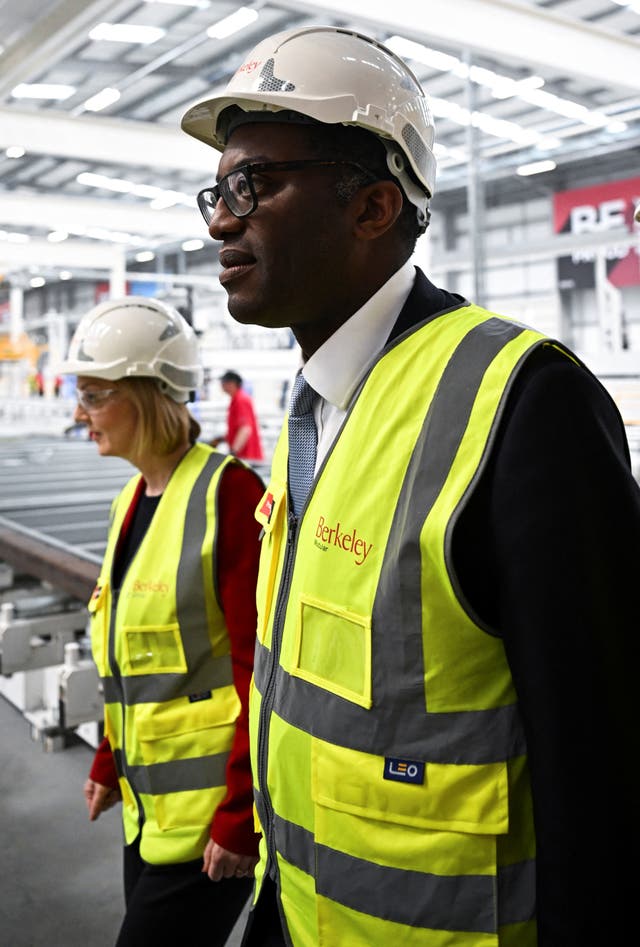Truss vows ‘decade of dynamism’ in hint at more tax cuts
The Prime Minister and Chancellor Kwasi Kwarteng defended their controversial raft of tax cuts amid accusations they mainly benefit the rich.

Prime Minister Liz Truss vowed to “usher in a decade of dynamism” and Chancellor Kwasi Kwarteng said their tax cuts were just the “first step towards igniting growth” as the pair were forced to defend the controversial measures.
Using more than £70 billion of increased borrowing, Mr Kwarteng announced the biggest programme of tax cuts for 50 years, including abolishing the top rate of income tax for the highest earners.
The £45 billion tax-slashing package was met with alarm by leading economists, some Conservative MPs and financial markets – with the pound tumbling to fresh 37-year lows.
Economists predict sterling could plunge to parity with the US dollar by the end of the year.
Such a slump could trigger a rebellion from Tory backbenchers, who could refuse to vote for the Government’s finance bill or submit letters of no confidence, the Telegraph reported, citing backers and critics of the Prime Minister.
Labour called the plans an admission of 12 years of Tory economic failure.
But Ms Truss insisted she is “unapologetic” in “focusing relentlessly on economic growth” as she defended her high-risk strategy designed to revive the UK’s stagnant economy.

In an op-ed for The Mail on Sunday, the Prime Minister wrote: “Growth means families have more money in their pockets, more people can work in highly paid jobs and more businesses can invest in their future. It provides more money to fund our public services, like schools, the NHS and the police.
“We will be unapologetic in this pursuit… everything we do will be tested against whether it helps our economy to grow or holds it back.”
Repeating her pledge to do things differently from previous Conservative administrations, she said: “We will usher in a decade of dynamism by focusing relentlessly on economic growth.”
Ms Truss also brushed off suggestions the measures could be fiscally irresponsible.
In an interview with CNN to be aired on Sunday but trailed in advance, she was asked about the responsibility of her economic plan.
“I don’t really accept the… premise of the question at all,” she told the US broadcaster.
“The UK has one of the lowest levels of debt in the G7, but we have one of the highest levels of taxes. Currently, we have a 70-year high in our tax rates.”
Mr Kwarteng said he looks forward to “proving the naysayers wrong” over his “mission to encourage investment and drive growth”.
“I want to reassure you that with our growth plan everyone wins. This is a plan that cuts taxes for all, not just the wealthy,” the Chancellor wrote in The Sun.
“This is the first step towards igniting growth across the UK, with ambitious reforms to boost our economy”.
It appears to be a signal that Ms Truss and Mr Kwarteng want to go further.
The pair could continue their tax-cutting spree in the new year with further reductions in income tax, as well as discounts for savers and child benefit claimants, according to the Telegraph, though Downing Street dismissed the report as “completely speculative”.
Such changes would likely come as part of a full new year Budget, following a tax review announced by Mr Kwarteng in last week’s fiscal statement.
Sir Keir Starmer denounced the “shower” in Downing Street in speeches to activists on the eve of the Labour conference in Liverpool, accusing ministers of “taking the piss” by offering tax cuts to the rich while giving less support to poorer households.
The Labour leader set out plans for a green energy revolution to boost economic growth as a counter to the Government’s policies.
As part of her mission to boost growth, Ms Truss is expected to loosen visa rules to allow foreign workers to more easily come to the UK to plug labour shortages.





